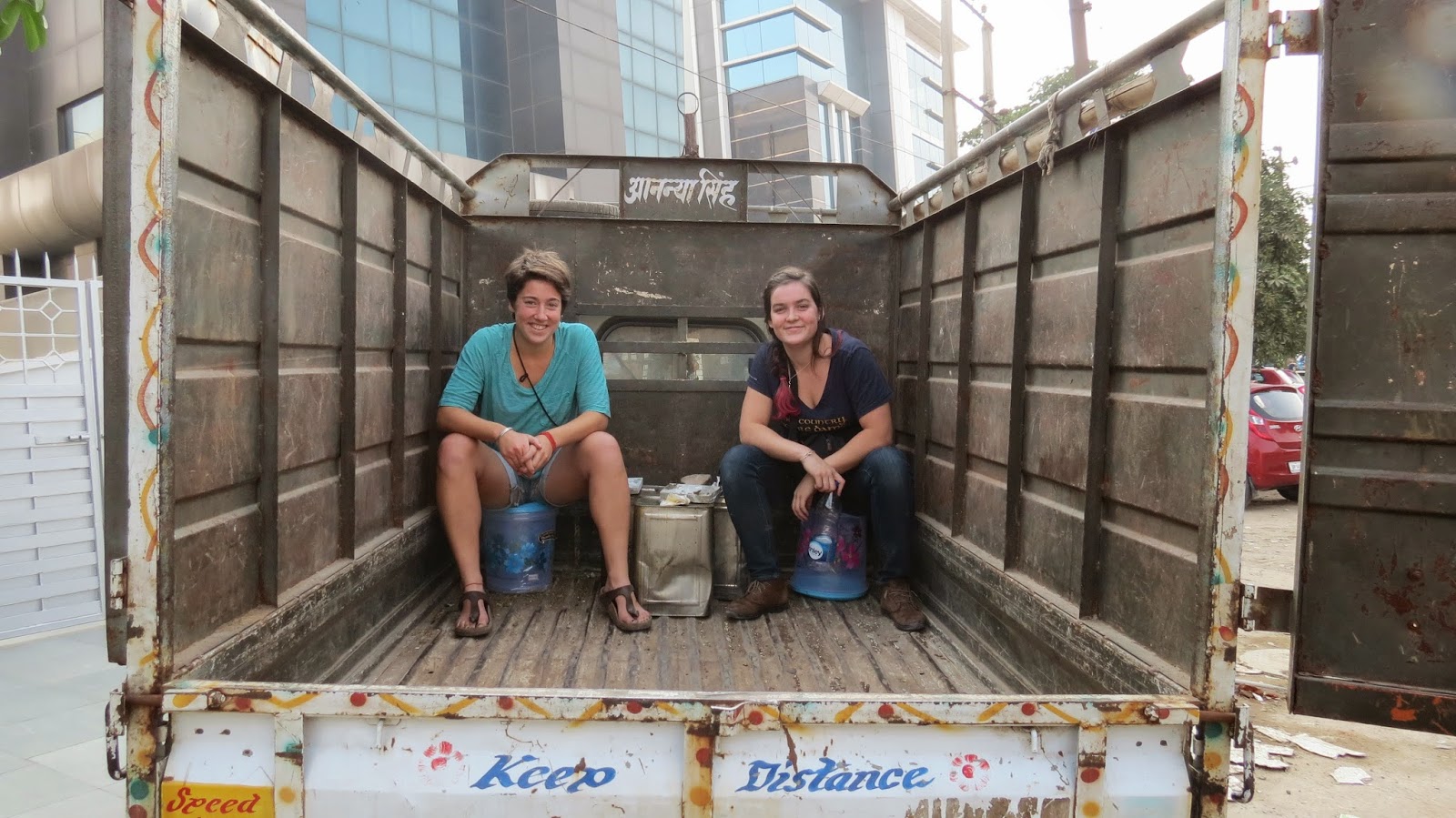- Public Policy
- Leadership
- Funding
- News & Events
- About the Center
Back to Top Nav
Back to Top Nav
Back to Top Nav
Back to Top Nav
Sarah Alexander ’14 and Meegan Daigler D’14, Th’15 are the founders of Street Food Biodiesel (SFB), a social enterprise based in New Delhi, India. A grant from the Rockefeller Center contributed in part to the funding needed to conduct a feasibility study and pilot of the project. Here are their Notes from the Field on how the start-up is progressing.

The Elevator Pitch:
SFB’s business model is simple: we partner with restaurants and street food vendors around New Delhi to purchase and collect waste cooking oil and then to convert it into biodiesel, a cleaner burning fuel that can be sold to diesel vehicle owners. India is famous for its street food culture, with over 3 million people actively engaged in selling (mostly fried) snacks and sweets. Despite the abundance of fried dishes however, there is no streamlined means for disposing of used cooking oil, and thus many restaurants and street vendors dump their waste oil down the drain. We provide a solution to this problem by purchasing used oil from food vendors, thus diverting a waste product. We then use the waste oil to produce biodiesel, a more sustainable fuel that helps to ameliorate the horrific air quality found today in urban India.
 |
| Sarah Alexander '14 and Meegan Daigler '14, Th'15 |
Our Responsibilities:
As founders of this company, we are in charge of running the show! As with any start-up company, we play many different roles. We delegate tasks to our team, which includes our fall intern, Jill Britton D’14, as well as our interpreter Akshita, and our drivers. Our responsibilities vary from organizing the daily agenda, strategizing how to best utilize local resources, reviewing marketing materials, pitching ourselves to potential partners, and generally managing the team morale to make sure we all stay positive and energized in spite of the challenges that arise! Though we hardly ever have a “typical” workday, our time is spent in three major ways—contracting, networking and collecting. During our contracting days, we go to markets in our target pilot areas and we essentially go door to door, pitching our business idea to restaurants and street vendors. We pass out business cards and pamphlets, and talk extensively with store managers and vendors to discuss pricing, collection and feasibility. Though some partners agree on the spot, most need time to think about our offer, which forces us to spend lots of our time on networking and follow-ups. We also take advantage of our time here by connecting with helpful organizations, like the National Association of Street Vendors of India (NASVI) and the Delhi College of Engineering. Once we have a partner on board, we begin collecting from them. Though our collection methods are still being honed, we try to go to each major market area once a week to collect oil and to pay our partners for their waste product.

Our First Days:
Our first day of work was somewhat jarring—the proverbial training wheels had come off, and it as time to see if our theoretical idea could prove itself off paper! We spent most of our first week purely on strategy. We talked with locals about what messages resonated with restaurants, consumers and street vendors. We designed pamphlets, practiced pitching to food vendors and made our tentative game plan. Our first day of contracting was stressful as well—we botched our first interaction, and ran out of the restaurant embarrassed. Yet slowly, with practice, we refined our messaging and by the end of the first week, we had figured out the perfect elevator pitch to convince even the most wary of partners.
Our Favorite Part:
Our favorite part of this job is finally seeing our project come alive on the ground. We’ve shifted away from models and paper-‐writing to actually talking to people and purchasing oil. We also have produced our first batches of biodiesel, thanks to the biodiesel lab at the Delhi College of Engineering, and we are excited to realize that everything we’ve imagined is actually working! After grappling with this project for over 2 years, we can finally breath a sigh of relief, and enjoy the rewards of the many hours spent pushing towards this goal.

Challenges We Face:
Perhaps the most challenging aspect of this job is trying to understand how systems in India work. We have to decode how communication, contracting, transportation and waste disposal all currently function, and how we can capitalize on pre-existing systems to build an effective business model. The process of decoding becomes even more challenging with the Hindi-‐English barrier, and so we rely heavily on our interpreter not only to literally translate our words, but also to help us understand more subtle cultural cues so we can figure out what messages resonate with our potential partners.
The End Goal:
Our goal by the end of our pilot is to be able to collect a consistent supply of oil from 10-15 vendors in the southern region of Delhi. We aim to collect around 75L of waste cooking oil per week.
Practical Lessons We've Learned:
We have been learned a multitude practical lessons while in India, but we will share just a few pieces of advice: 1. Travel times on Google Maps should be multiplied by four for an accurate time estimate when getting around Delhi. 2. Never judge a restaurant by its appearance--even high end restaurants can cook oily food. 3. Persistent calling pays off and follow-ups build lasting partnerships 4. Sometimes timing is everything. By playing off Prime Minister Modi’s new campaign to clean up the streets, our offer to bring a US technology that helps with recycling is more exciting to vendors and restaurants than ever before.